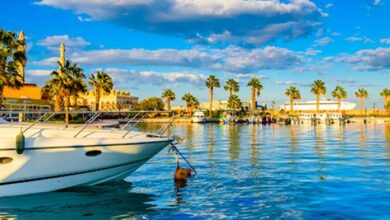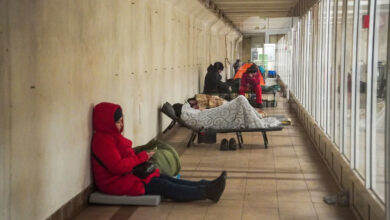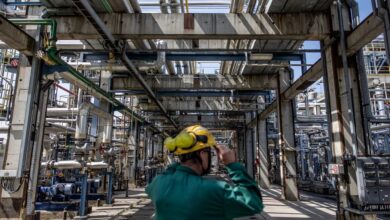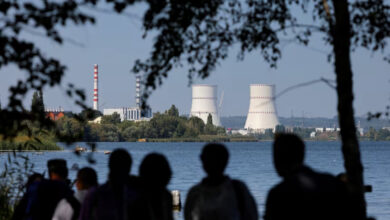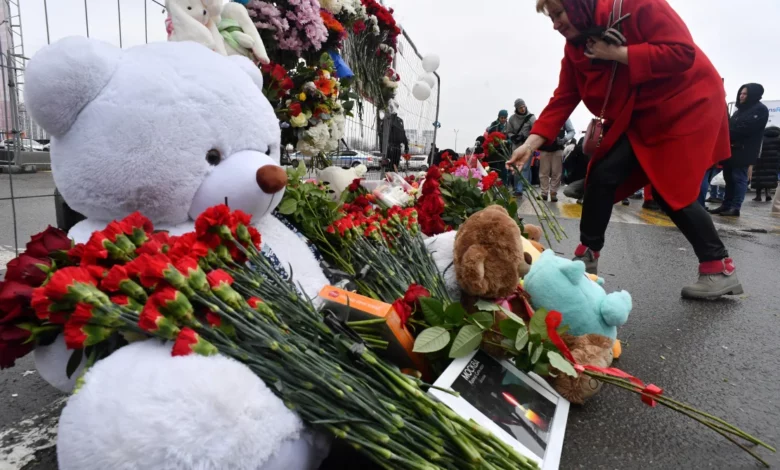
Russia has been left reeling in the wake of the nation’s worst terrorist attack in decades.
Nearly a dozen people have been detained in connection with the attack, which saw armed assailants storm a popular concert venue complex on the outskirts of the capital, killing more than 130 people.
Here’s what we know.
What happened?
Attackers armed with guns and incendiary devices opened fire at random at the Crocus City complex – home to both a popular music hall and shopping center – on Friday night.
Crowds were still filing in but the auditorium was already packed with people ahead of a concert by the band Picnic. Some 6,500 tickets had reportedly been sold for the show. But instead of a night dancing away to rock music, sheer chaos unfolded.
Panicked eyewitnesses captured on video the exact moment gunmen, dressed in camouflage fatigues and carrying automatic weapons, started shooting indiscriminately. The footage showed concertgoers screaming and ducking for cover behind cushioned seats while others huddled together as shots echoed through the vast hall.
During the rampage, one group sheltering next to a large wall of windows outside the concert venue were forced to break them to escape the gunfire, video obtained by CNN shows.
An unnamed male witness who survived the attack said the gunmen entered the concert hall and “started shooting everyone.”
“I was sitting in the hall upstairs where the balconies were. We heard gunshots. At first, we didn’t understand what had happened,” he said in an interview with Ostorozhno Novosti, which was published by Reuters. He added that the attackers threw a Molotov cocktail, setting “everything was set on fire.”
The band’s manager later told state media that the performers were unharmed.
A SWAT team was called to the area and more than 70 ambulance teams and doctors assisted victims.
Fires were still burning at Crocus City on Saturday and the roof of the venue had partially collapsed. Nearly 500 personnel were working to dismantle rubble at the scene, the Russian Emergencies Ministry said.
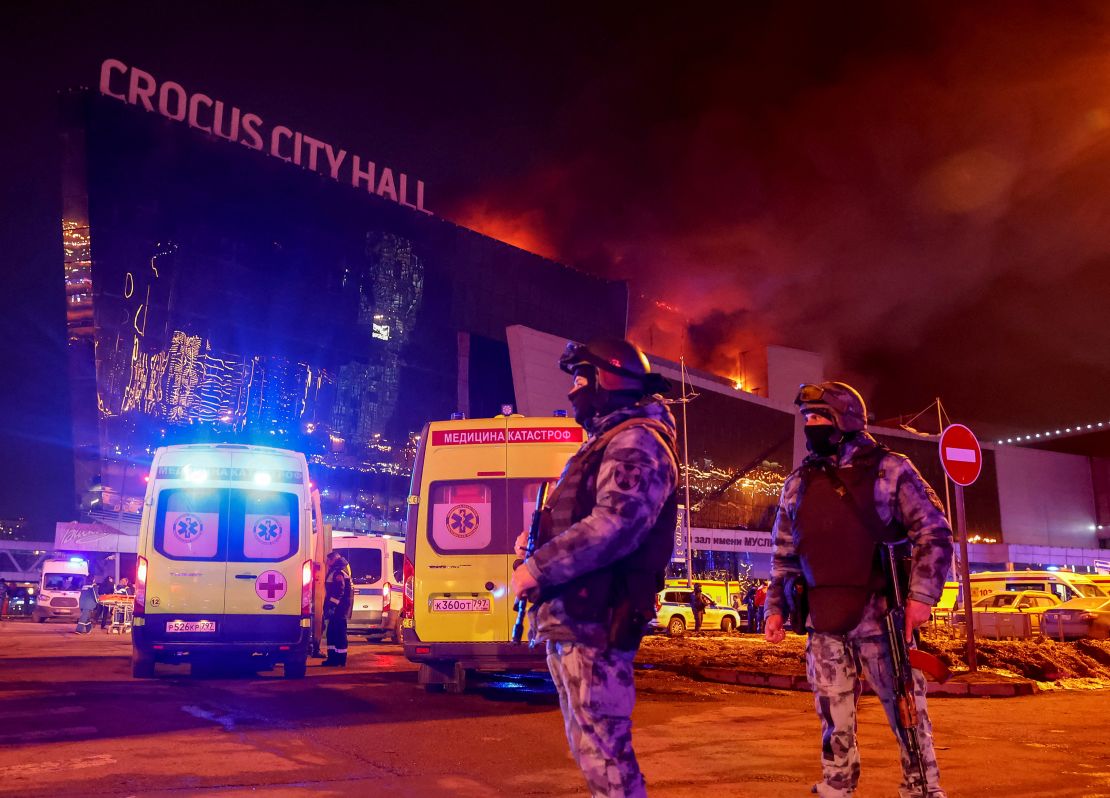
How many have been hurt?
At least 133 people are known to have been killed at the vast complex, according to the latest update from Russia’s Investigative Committee on Saturday. Authorities say that number is likely to keep rising as emergency responders work through the scene.
Additionally, more than 100 others were injured in the incident – with many of them in serious condition, including two children.
The governor of Moscow region, Andrey Vorobyov, said Saturday that the victims of the terror attack would receive financial compensation from the region and city governments.
Relatives of each of those who died would receive three million rubles ($32,500), while those injured and in hospital would receive one million rubles ($10,840).
“Children registered in the Moscow region whose father or mother died in the tragedy will also receive monthly payments. In addition, we will compensate everyone for burial expenses and resolve all legal issues,” Vorobyov added.
Who was behind the attack?
ISIS claimed responsibility for the assault in a short statement published by the ISIS-affiliated Amaq news agency on Telegram on Friday.
The following day, the terror group published an image through Amaq purporting to show the four men who had attacked the complex. None of the men were identifiable in the image; all were wearing balaclavas and the rest of their faces are blurred.
ISIS described the attack as the “fiercest in years,” according to a translation of the message by the SITE Intelligence Group, which monitors terror groups’ propaganda.
Amaq provided details of the attack, saying that three fighters attacked the gathered crowd at the venue with guns and knives while the fourth threw incendiary devices. It said the attack was preceded by an intensive surveillance operation of the place.
It added that “the attack comes within the normal context of the raging war between the Islamic State and countries fighting Islam,” according to the translation by SITE.
The United States had previously warned Moscow that ISIS militants were determined to target Russia in the days before assailants stormed the concert hall.
Earlier this month, the US embassy in Russia had said it was “monitoring reports that extremists have imminent plans to target large gatherings in Moscow,” including concerts, and it warned US citizens to avoid such places.
US National Security Council spokesperson Adrienne Watson said the US government had “shared this information with Russian authorities in accordance with its longstanding ‘duty to warn’ policy.”
But in a speech on Tuesday, Putin had blasted the American warnings as “provocative,” saying “these actions resemble outright blackmail and the intention to intimidate and destabilize our society.”
Experts said the scale of the carnage would be deeply embarrassing for the Russian leader, who had championed a message of national security just a week earlier when winning the country’s stage-managed election.
Over the last month, Russia has thwarted several ISIS related incidents in March alone, according to RIA Novosti.
There have been at least four reported incidents across Russia that local authorities said involved people connected to ISIS, according to RIA.
What else is Russia saying?
Putin expressed his deep condolences following the shooting, describing it a “bloody and barbaric act” in a video statement released Saturday.
He showed gratitude to emergency service workers who “did everything to save people’s lives, to get them out from under fire, from the epicenter of fire and smoke,” and said agencies were working to establish the details of the massacre.
Earlier, Russian state media reported that the head of the Russian Security Service, Alexander Bortnikov, had told the Russian leader that 11 people had been detained in connection with the attack.
The Kremlin has said that four people believed to be directly involved in the attack had been arrested while trying to cross the border into Ukraine, according to TASS and other state media outlets.
Putin also appeared to pin the blame on Ukraine for the deadly attack in a video statement released Saturday, in which he claimed that a “window” was prepared for attackers to escape to Ukraine. The Russian leader also described the deadly incident as a “barbaric terrorist attack” as he expressed deep condolences and declared Sunday a national day of mourning.
Russian Foreign Ministry spokesperson Maria Zakharova said on Telegram: “Now we know in which country these bloody bastards planned to hide from persecution – Ukraine.”
Ukraine strenuously denied any involvement. The Ukrainian Foreign Ministry said Friday: “We consider such accusations to be a planned provocation by the Kremlin to further fuel anti-Ukrainian hysteria in Russian society, create conditions for increased mobilization of Russian citizens to participate in the criminal aggression against our country and discredit Ukraine in the eyes of the international community.”
Ukrainian Defense Intelligence alleged Friday – without giving evidence that the attack was planned by Russian special services to justify increased strikes on Ukraine.
What’s the international response been?
Condemnation of the attack from world leaders has been swift. British Foreign Secretary David Cameron on Saturday said “the UK condemns in the strongest terms the deadly terrorist attack” as did German Chancellor Olaf Scholz who conveyed that his nation’s “thoughts are with the families of all the victims and all those injured.”
French President Emmanuel Macron expressed solidarity with all Russians, while India’s Prime Minister Narendra Modi and Saudi Arabia’s Crown Prince Mohammed bin Salman both also denounced the attack.
Chinese leader Xi Jinping offered his condolences to Putin on Saturday “over the serious terrorist attack that caused heavy casualties,” according to a report from Chinese state media.
Meanwhile, the United Nations Security Council labeled it a “heinous and cowardly” attack, as Secretary-General Antonio Guterres condemned the incident “in the strongest possible terms.”
CNN’s Anna Chernova, Darya Tarasova, Tim Lister, Mariya Knight, Mia Alberti, Jennifer Hauser, Paul Murphy, Matthew Chance, Mary Kay Mallonee, Katherine Grise and Chris Lau contributed reporting.

